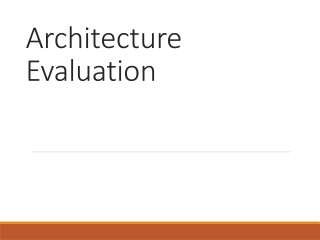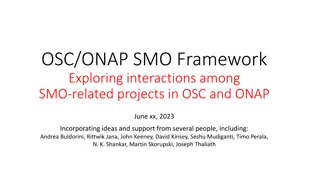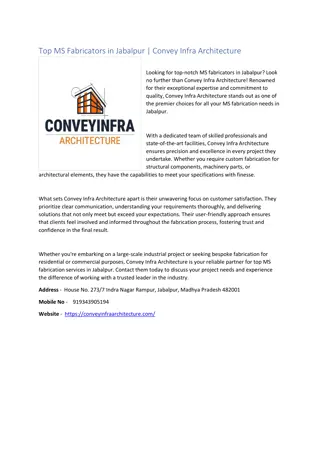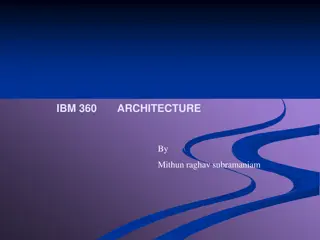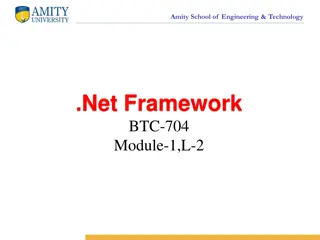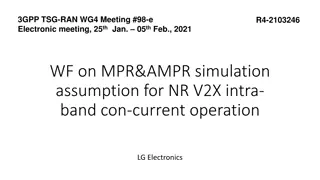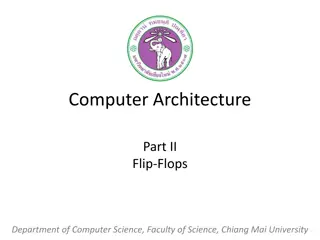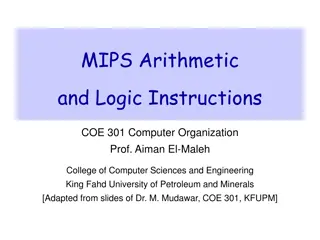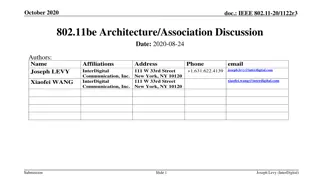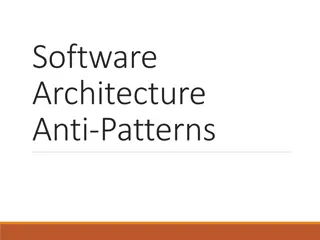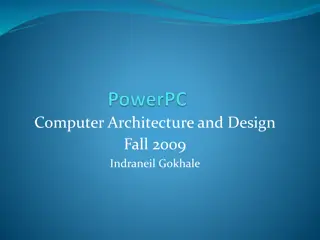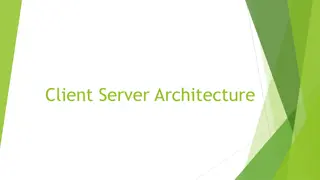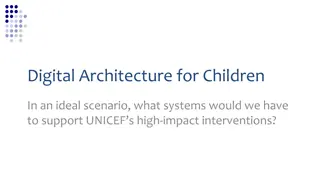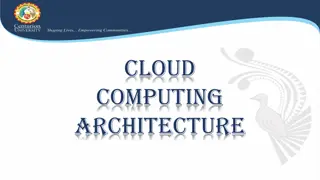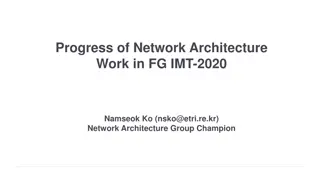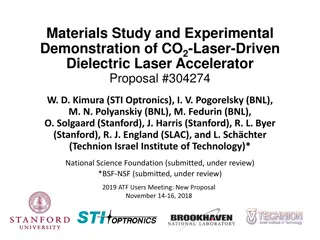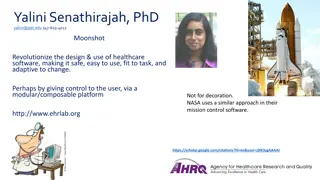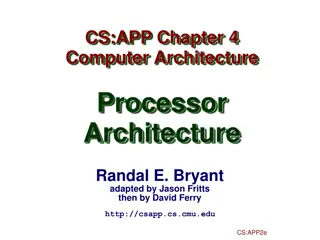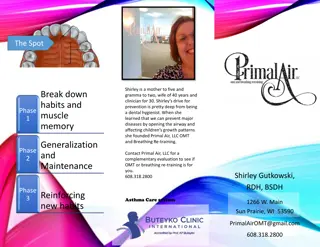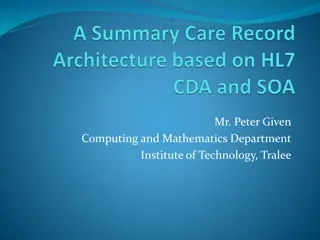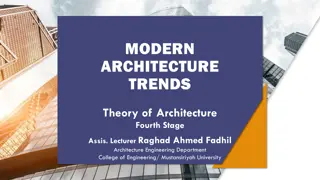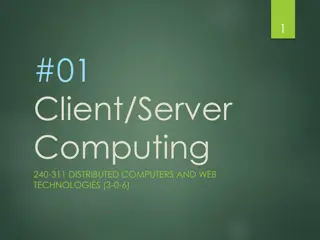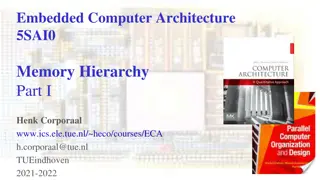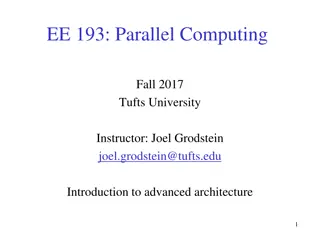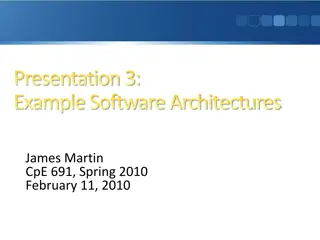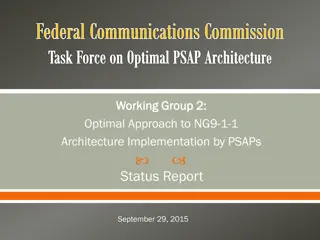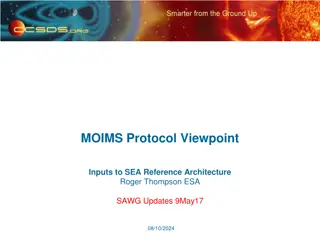❤Book⚡[PDF]✔ The Apollo Guidance Computer: Architecture and Operation (Springer
\"COPY LINK HERE ; https:\/\/getpdf.readbooks.link\/1441908765\n\nDownload Book [PDF] The Apollo Guidance Computer: Architecture and Operation (Springer Praxis Books) | The Apollo Guidance Computer: Architecture and Operation (Springer Praxis Books)\n\"\n
2 views • 6 slides
Architecture Evaluation
Exploring various aspects of software architecture evaluation, including tradeoff analysis methods, factors affecting architecture quality, and the importance of evaluating design decisions early in the software development life cycle to avoid costly changes later on.
3 views • 26 slides
Understanding Computer Organization and Architecture
A computer system is a programmable digital electronics device that processes data as per program instructions to provide meaningful output. It comprises hardware and software components, with hardware being the physical parts and software essential for driving the hardware. Computer organization fo
14 views • 71 slides
Decoupled SMO Architecture Overview
Develop flows showing interaction between SMO modules in the context of open-source architecture using OSC, ONAP, and other code. The objective is to align open-source work with O-RAN trends, improve synergy, reduce duplication, and provide feedback to O-RAN discussions. Related work includes Decoup
4 views • 27 slides
Exploring Interactions Among SMO-related Projects in OSC and ONAP
Coverage of SMO functionality is increasing in OSC projects with strong overlap between OSC and ONAP for SMO-related functionality. Consensus at TOC/TSC level in OSC and ONAP to align with trends in SMO-related discussions in O-RAN Alliance, especially WG1 SMO Decoupled Architecture TR. Efforts to a
5 views • 32 slides
Top MS Fabricators in Jabalpur | Convey Infra Architecture
Convey Infra Architecture, led by Alok Tiwari, stands out as one of the top MS fabricators in Jabalpur. With a commitment to precision and quality, their expertise in metal fabrication is unmatched. From intricate designs to large-scale projects, they ensure seamless execution and durable results. A
4 views • 1 slides
Evolution of IBM System/360 Architecture and Instruction Set Architectures
The IBM System/360 (S/360) mainframe computer system family, introduced in 1964, revolutionized computing by offering forward and backward compatibility, a unified instruction set architecture (ISA), and a balance between scientific and business efficiency. The critical elements of this architecture
1 views • 18 slides
Overview of .NET Framework and CLR Architecture at Amity School of Engineering
Explore the .NET Framework and Common Language Runtime (CLR) architecture at Amity School of Engineering & Technology, covering topics such as .NET components, technical architecture, common language runtime, CLR execution model, and more. Discover the support for multiple languages and the .NET lan
0 views • 28 slides
Overview of RF Architecture and Waveform Assumptions for NR V2X Intra-Band Operation
In the electronic meeting of 3GPP TSG-RAN-WG4, discussions were held on the RF architecture and waveform assumptions for NR V2X intra-band operation in band n79. Various options and recommendations were presented regarding RF architecture, antenna architecture, and waveform definitions for efficient
1 views • 7 slides
Understanding Combinational Circuits in Computer Architecture
Combinational circuits in computer architecture play a crucial role in transforming binary information from input data to output data. These circuits consist of logic gates connected in a specific arrangement to process binary data efficiently. Key components such as half-adders and full-adders are
1 views • 48 slides
Overview of Policy Service Node (PSN) Architecture
The Policy Service Node (PSN) architecture consists of various key components such as Policy Administration Node (PAN), Monitoring Node (MnT), Inline Posture Node (IPN), and Multi-Function Node. These components work together to enable efficient policy management and network monitoring within a netw
1 views • 5 slides
Understanding Computer Architecture and Organization
Computer architecture and organization are fundamental aspects of computing systems. Computer architecture focuses on the functional design and implementation of various computer parts, while computer organization deals with how operational attributes come together to realize the architectural speci
3 views • 40 slides
Overview of MIPS Arithmetic and Logic Instructions in COE 301
MIPS Architecture consists of R-Type and I-Type instruction formats for arithmetic, logical, shift, and immediate constant operations. It includes a variety of general-purpose registers and specific units for execution, floating-point operations, and memory handling. The presentation outlines the st
2 views • 29 slides
Overview of RESTful Web Services and Service-Oriented Architecture
This content provides insights into RESTful Web Services, Service-Oriented Architecture (SOA), Traditional Web Services, Overcomplication in system design, and Resource-Oriented Architecture. It discusses key concepts, technologies, and standards involved in these architectures, along with details o
2 views • 18 slides
Discussion on IEEE 802.11be MLD Architecture Alignment
IEEE 802.11 TGbe is exploring MLDs within the 802 architecture, focusing on aligning MLD operations with existing 802.11 features for enhanced compatibility. The MLD architecture aims to facilitate the flow of data between MAC SAPs and PHY SAPs, extending the current framework for APs and non-AP STA
1 views • 23 slides
Common Software Architecture Anti-Patterns
Anti-patterns in software architecture are commonly occurring solutions to problems that lead to negative consequences. These arise due to insufficient knowledge or experience, misuse of design patterns, and lack of attention to evolving project architecture. Examples include Jumble, Stovepipe, Spag
1 views • 7 slides
PowerPC Architecture Overview and Evolution
PowerPC is a RISC instruction set architecture developed by IBM in collaboration with Apple and Motorola in the early 1990s. It is based on IBM's POWER architecture, offering both 32-bit and 64-bit processors popular in embedded systems. The architecture emphasizes a reduced set of pipelined instruc
2 views • 13 slides
Understanding Client-Server Architecture
Client-server architecture is a computing model where a central server hosts and manages resources and services for client computers over a network. There are different types of clients and servers, each with unique characteristics and roles. This architecture offers various advantages and disadvant
3 views • 15 slides
Roles of Community Health Nurse: Presented by Mr. Ajith K.K.
Community Health Nurses play various roles including Clinician, Educator, Advocate, Manager, Collaborator, Leader, and Researcher. The Clinician role focuses on providing holistic care, health promotion, and wellness services to individuals, families, groups, and populations. The Educator role invol
1 views • 24 slides
Digital Architecture for Supporting UNICEF's High-Impact Interventions
In an ideal scenario, the digital architecture for children would encompass systems such as Enterprise Architecture, Functional Architecture, and Solution Architecture to support UNICEF's high-impact interventions. It would involve integrated platforms for Health Information Exchange, Supply Chain M
1 views • 19 slides
Understanding Cloud Computing Architecture and Services
Cloud computing architecture combines service-oriented and event-driven architecture to facilitate information storage and access via the internet. It consists of front end and back end components, with client infrastructure, applications, and cloud services as key elements. Cloud computing offers S
0 views • 11 slides
Progress of Network Architecture Work in FG IMT-2020
In the Network Architecture Group led by Namseok Ko, significant progress has been made in defining the IMT-2020 architecture. The work has involved gap analysis, draft recommendations, and setting framework and requirements. Phase 1 focused on identifying 19 architectural gaps, such as demands for
1 views • 11 slides
Strategies for Effective Clinician Partnership in Translational Science
Engage clinicians effectively by building relationships, addressing barriers, and highlighting benefits. Understand clinician perspectives and leverage established patient relationships to advance translational science research. Overcome participation barriers for both clinicians and patient-partici
0 views • 23 slides
Tobacco Treatment Counseling: Strategies and Guidelines for Clinicians
Effective tobacco treatment counseling strategies, including addressing physiological and behavioral aspects of dependence, offering pharmacological treatments, and utilizing various clinician types, can significantly increase the likelihood of successful smoking cessation. Clinician interventions p
0 views • 44 slides
CO2-Laser-Driven Dielectric Laser Accelerator Proposal
Study and experimental demonstration of a CO2-laser-driven dielectric laser accelerator, addressing the limitations of current accelerator technologies by utilizing longer laser wavelengths for increased charge and improved beam control. The proposal aims to develop a novel in-vacuo scheme for ultra
0 views • 13 slides
Revolutionizing Healthcare Software Design and User Control
Moonshot to revolutionize healthcare software design, making it safe, easy to use, and adaptable. The approach involves modular platform control for users, inspired by NASA's mission control software. The MedWISER model aims for clinician-driven, composable architecture in healthcare systems. Focus
0 views • 8 slides
Proposed Way Forward for Service-Oriented Architecture (SOA) in Space Missions
Proposed establishment of a Working Group by the CESG to develop a Service-Oriented Architecture (SOA) framework for space mission operations within the CCSDS. The focus includes identifying services, use cases, architecture definitions, and business cases to enhance CCSDS-wide interoperability and
0 views • 7 slides
Introduction to Y86 Instruction Set Architecture
Y86 Instruction Set Architecture is a simplified pseudo-language based on x86 (IA-32) architecture. It involves implementing the Fetch-Decode-Execute cycle, where instructions are fetched from memory, decoded, and executed. The Y86 ISA offers a simpler set of instructions and formats compared to x86
0 views • 25 slides
Guidelines for Academic Promotions in Medical School
Academic promotions in a medical school are crucial for recognizing achievements, maintaining competitiveness, and serving the institution's interests. Promotion criteria include teaching effectiveness, scholarly activity, clinical service, and active participation in various communities. Meritoriou
0 views • 47 slides
Shirley Gutkowski: Preventive Clinician and Founder of Primal Air, LLC
Shirley Gutkowski, a dedicated clinician with 30 years of experience, is on a mission to prevent major diseases by addressing children's growth patterns through Primal Air, LLC. Specializing in orofacial myofunctional therapy and Buteyko breathing retraining, Shirley offers services to help overcome
0 views • 4 slides
Enhancing Healthcare Data Sharing with Service-Oriented Architectures
This paper explores how Service-Oriented Architectures (SOA) can be integrated with the HL7 Clinical Document Architecture to facilitate the sharing of Summary Care Records between healthcare information systems. It highlights the benefits of a federated architecture based on SOA and coding standard
0 views • 51 slides
Exploring Modern Architecture Trends: Expressionism and Bauhaus Movement
Delve into the world of modern architecture trends, focusing on Expressionist architecture in Europe during the early 20th century and the influential Bauhaus movement in Germany. Expressionist architecture emphasized emotional effects through distorted forms inspired by nature, while the Bauhaus sc
0 views • 10 slides
Overview of 5G System Architecture and User Plane Functionality
This content showcases various aspects of 5G system architecture, including system handover, non-roaming architecture, service-based architecture, and user plane functionality. It delves into the control plane functions, user plane functions, and core network endpoints of the 5G network. The images
0 views • 49 slides
Understanding Client/Server Computing Architecture
Client/Server Computing architecture separates clients and servers over a network, allowing for file sharing, resource allocation, and service requests. Clients initiate services from servers, with transparent server locations and message-passing transactions. Systems with C/S architecture include f
0 views • 18 slides
Department of Medicine Research Initiatives and Opportunities
The Department of Medicine (DoM) at the University of Toronto is a hub of research excellence with a focus on patient-driven work, equity, diversity, and social accountability. The DoM offers numerous research opportunities for residents and faculty members, emphasizing the importance of engaging wi
0 views • 10 slides
Understanding Memory Hierarchy and Different Computer Architecture Styles
Delve into the concepts of memory hierarchy, cache optimizations, RISC architecture, and other architecture styles in embedded computer architecture. Learn about Accumulator and Stack architectures, their characteristics, advantages, and example code implementations. Explore the differences between
0 views • 52 slides
Understanding Advanced Computer Architecture in Parallel Computing
Covering topics like Instruction-Set Architecture (ISA), 5-stage pipeline, and Pipelined instructions, this course delves into the intricacies of advanced computer architecture, with a focus on achieving high performance by optimizing data flow to execution units. The course provides insights into t
0 views • 12 slides
Software Architecture Design for Document Filter System: A Case Study
This presentation delves into the software architecture design and implementation of a Document Filter System (DFS) aimed at efficiently finding relevant information. It discusses the architecture's effectiveness in supporting diverse applications, multilingual document searching, complex query func
0 views • 33 slides
Optimal Approach to NG9-1-1 Architecture Implementation by PSAPs
Federal Communications Commission Task Force on Optimal PSAP Architecture Working Group 2 explores the evolution of 9-1-1 systems from legacy circuit-switched routing to IP-based architectures. It delves into the challenges faced in designing the optimal NG9-1-1 architecture, emphasizing the shift t
0 views • 20 slides
MOIMS Protocol Viewpoint for SEA Reference Architecture Updates
This content describes the MOIMS Protocol Viewpoint inputs to the SEA Reference Architecture updates by Roger Thompson from ESA SAWG. It includes details about the graphical conventions, data store elements, organizational domains, network layers, communications protocols, and space communications c
0 views • 21 slides
![❤Book⚡[PDF]✔ The Apollo Guidance Computer: Architecture and Operation (Springer](/thumb/21611/book-pdf-the-apollo-guidance-computer-architecture-and-operation-springer.jpg)
